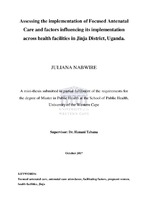| dc.contributor.advisor | Tabana, Hanani | |
| dc.contributor.author | Nabwire, Juliana | |
| dc.date.accessioned | 2018-04-18T07:52:14Z | |
| dc.date.available | 2018-04-18T07:52:14Z | |
| dc.date.issued | 2017 | |
| dc.identifier.uri | http://hdl.handle.net/11394/5951 | |
| dc.description | Magister Public Health - MPH (Public Health) | |
| dc.description.abstract | The World Health Organization recommends focused antenatal care (FANC)
to limit the number of times a pregnant woman makes visits to the health facility (if there is
no other need) to four while ensuring that she receives a set of evidence-based interventions
at each of the visits to achieve healthy outcomes for the mother and baby. Uganda adopted
the FANC approach in 2003 across the health care system although reports indicate that only
48% of pregnant women make at least four visits during the course of their pregnancy and the
quality of antenatal care (ANC) services needs improvement. This study investigated FANC
implementation and related influencing factors as perceived by the health workers across the
health system in Jinja district. | |
| dc.language.iso | en | |
| dc.publisher | University of the Western Cape | |
| dc.title | Assessing the implementation of Focused Antenatal
Care and factors influencing its implementation
across health facilities in Jinja District, Uganda | |
| dc.rights.holder | University of the Western Cape | |

